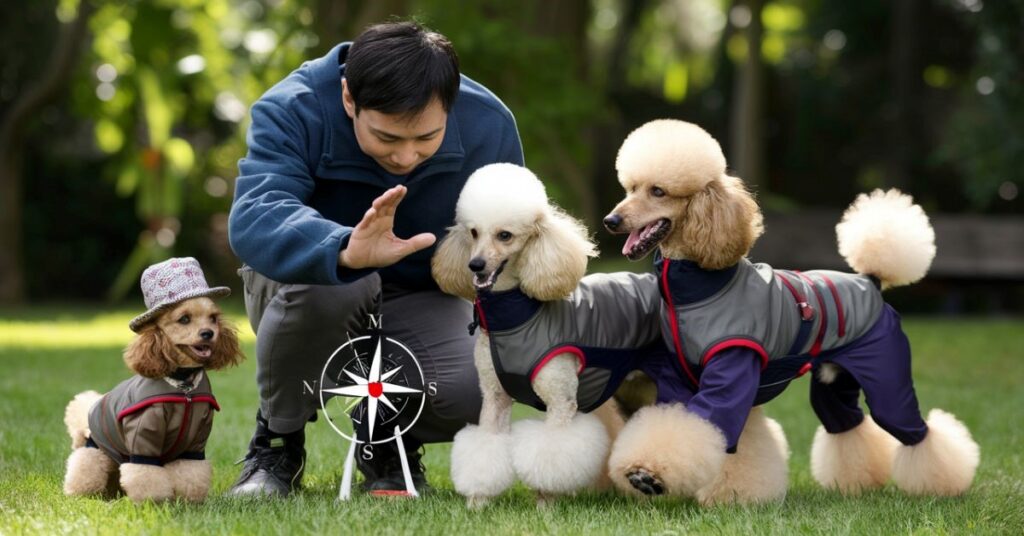I was wondering that if I buy a dog which one should I get, I need something that goes along well with my family and he is smart as well. By digging deeper I found out that, toy Poodle are among the most popular small dog breeds in the world and I think they are the perfect family dog because of their reputation for being intelligent, playful, and cute, they are a favorite among families and solo dwellers alike. But is a Toy Poodle right for your family? I did the research and in this article I will tell you all the information about Toy Poodles, like their personality and care requirements.
What is a Toy Poodle?
The Toy Poodle is the smallest of three poodle dog breeds, the other two being Standard Poodles and Miniature Poodles. Though they may be little, Toy Poodles pack all the intelligence, gracefulness, and charm of their bigger brethren. These puppies usually weigh between 4-6 pounds and reach around 10 inches tall at the shoulders.

History of the Toy Poodle
Before talking about the fact that are toy poodle the perfect family dog first we would look a bit about their background. The Poodle is a water retriever that has its roots in Germany. In France, it was refined and earned its reputation of being stylish. The Toy Poodle was developed deliberately to be a companion dog, ideal for families or singles wanting a smaller pooch that would thrive in the city.
Personality and Temperament
Intelligent and Easy to Train
Of all Toy Poodle characteristics, one of the most outstanding is their intelligence level. High on the list of intelligent dog breeds, these dogs are easy to train and learn new tricks and commands quickly. This makes them ideal for families that would like a dog capable of being trained to have good manners and learn some amusing tricks. That’s why toy poodle are the perfect family dog.

Playful and Loving
Even though Toy Poodles are small-sized dogs, they tend to be playful and cuddly in nature. They enjoy spending time with their families, whether that means playing fetch, cuddling on the couch, or going for a walk. They develop an attachment to their owners and grow very fond, making them great companions with kids or adults.
Good with Kids and Other Pets

They are sweet with children and can be a great family dog. But due to their size, supervised playtime is recommended, especially with small children who do not realize how fragile these dogs can be. Toy Poodles generally mix well with other pets — including dogs and cats — when they are appropriately introduced.
Health and Lifespan
Common Health Issues
Although Toy Poodles are usually a healthy breed, they may be at risk for some small size and genetic inherited health issues, such as:
- Patellar Luxation: A dislocated kneecap causing discomfort.
- Progressive Retinal Atrophy (PRA): A hereditary eye disorder that can lead to blindness.
- Dental Issues: Toy Poodles are prone to gum disease and tooth decay.
Maintaining Good Health
Regular vet check-ups are crucial. A balanced diet, regular exercise, and dental hygiene can help prevent many health issues. Toy Poodles typically live from 12 to 15 years, with many living even longer.
Grooming Needs
A High-Maintenance Coat
The Toy Poodle’s curly coat is both exquisite and hypoallergenic. Regular brushing is needed to prevent matting, and professional grooming every 4 to 6 weeks is advised.
Bathing and Skin Care
With sensitive skin, gentle dog-friendly shampoos are a must. Bathing every couple of weeks is usually enough unless they get dirty frequently.
Dental Care
Toy Poodles are susceptible to dental issues. Regular brushing and dental chews can help maintain oral health.
Exercise and Activity Levels
Small But Energetic
These small dogs are energetic and need daily exercise. Activities like fetch, agility training, and swimming are great for keeping them fit.
Mental Stimulation
Toy Poodles love mental challenges. Puzzle toys, teaching new tricks, and dog sports help keep their minds sharp and prevent boredom.

Diet and Nutrition
A Toy Poodle needs a balanced, protein-rich diet with minimal fillers. Small breed-specific food is recommended. Control portions and feed them twice a day to maintain a healthy weight.
Foods to Avoid:
- Chocolate
- Grapes and raisins
- Onions and garlic
- Caffeine
- Alcohol
Training and Socialization
Toy Poodles are smart but need proper training to avoid bad habits. Start with basic commands and use positive reinforcement techniques. Early socialization is key to prevent anxiety and fearfulness.
Living with a Toy Poodle
Toy Poodles adapt well to both apartments and large homes but prefer environments where they get plenty of family time. They may develop separation anxiety if left alone for too long.
Traveling with a Toy Poodle
Their small size makes them great travel companions. They fit easily into travel carriers and are often allowed on planes and public transport. That makes toy poodle perfect family dog
Is toy Poodle perfect for being your family dog?
Pros:
- Intelligent and easy to train
- Hypoallergenic coat
- Affectionate and playful
Cons:
- High grooming needs
- Prone to certain health issues
- Sensitive to being left alone
Tips for Choosing a toy Poodle
Finding a Reputable Breeder
Choose a breeder who tests for genetic health issues. Avoid puppy mills and pet stores.
Adoption Options
Consider adopting from a rescue or shelter, as many Toy Poodles need loving homes.
Conclusion: Are Toy Poodles the Perfect Family Dog?
Toy Poodles can be a great choice for families seeking a small, intelligent, and affectionate dog. They are good with children, adapt well to different environments, and are easy to train, but they require commitment in terms of grooming and health care.
Ultimately, whether a Toy Poodle is right for you depends on your lifestyle. With proper care, a Toy Poodle can be a delightful, loyal companion for many years. If you’re ready to welcome a Toy Poodle into your home, you’ll likely find a loving addition to your family.

